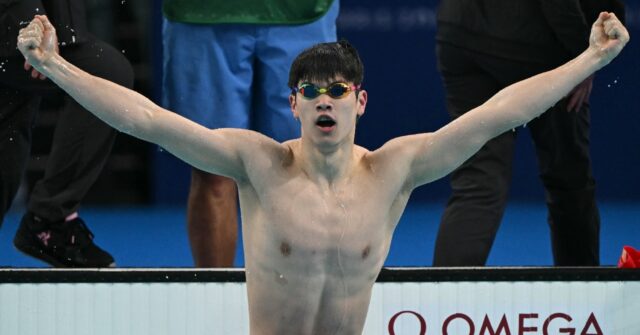Pan Zhanle and stalwart Zhang Yufei spearheaded China to 12 Olympic medals in the Paris pool, shrugging off intense scrutiny over a doping controversy that engulfed the team ahead of the Games.
Their haul — two gold, three silver and seven bronze — was an improvement on their total Tokyo collection of nine.
Once again, they finished behind perennial pacesetters the United States and Australia.
The team came to Paris under a dark cloud after the New York Times reported in April that 23 Chinese swimmers tested positive for the banned substance trimetazidine (TMZ) ahead of Tokyo.
China claimed it was the result of food contamination — an explanation accepted by the World Anti Doping Agency (WADA).
But US anti-doping authorities angered their Chinese counterparts by accusing WADA of covering up the facts of the case and the scandal overshadowed their preparations.
Butterfly ace Zhang, on the scene for a decade with 10 Olympic medals to her name, including five bronze in Paris, was reportedly among the 23 and admitted it had been stressful in France.
“I competed very well with friends from different countries, now I come to participate in the Olympic Games I am very worried that my good friends look at me with (suspicious) eyes and they do not want to compete with me,” she said.
“I am worried that French people think that Chinese athletes do not deserve to stand on this stage.”
In fact, fans at La Defense Arena were respectful, greeting Chinese athletes with applause.
Zhang, who again anchored the team, urged any doubters to look at the details of the case.
“Each one of us was tested 20 to 30 times in two months, three to four times a week on average,” she said, noting none were positive.
‘Expert’
World Aquatics data released days before the Games showed Chinese swimmers in Paris — including 11 of the 23 embroiled in the doping scandal — had been tested at least 10 times since the beginning of the year.
Including tests conducted by other organisations, Chinese swimmers were tested on average 21 times — far more than any other nation.
It wasn’t enough, however, to silence the critics when Pan swam an extraordinary 46.40sec to shatter his own 100m freestyle world record.
The 19-year-old, who was not among the 23 swimmers in the report, called it a “magic moment” and Australian silver medallist Kyle Chalmers said he was confident the race was clean.
But the manner of the win sparked an angry response from Australian Olympian-turned swimming coach Brett Hawke, who mentored Brazil’s Cesar Cielo — the first man to break 47 seconds.
“I’ve studied speed. I understand it. I’m an expert in it, that’s what I do,” he said on Instagram.
“You don’t beat those guys by one full body length in 100 freestyle. That’s not humanly possible.”
Other Chinese on podium included Xu Jiayu with silver in the men’s 100m backstroke while Wang Shun earned bronze in the 200m medley behind French hero Leon Marchand.
Tang Qianting collected silver in the women’s 100m breaststroke.
Britain’s three-time Olympic champion Adam Peaty found China’s gold medal-winning success in the 4x100m medley hard to believe, saying on Sunday “there’s no point winning if you’re not winning fair”.
Yet Peaty aimed his criticism at the anti-doping authorities: “To the people that need to do their job — wake up and do your job.”
There were some Chinese misses, notably Qin Haiyang who swept all three breaststroke titles at the 2023 world championships and broke the 200m world record.
Qin, reportedly among the 23, wilted in the pressure-cooker atmosphere, fading to seventh in the 100m final and failing to even make the 200m final.
In China, their performance was praised by most internet users and state-controlled media.
But fans were angry over the number of tests they were forced to take, sometimes early in the morning which they suggested had an effect on their performances.
“Chinese sportsmen and women have not been given fair conditions”, said one, in comments that reflected the general tone of reaction.
Official media blasted the continued suspicion hanging over the team, despite being cleared by WADA.
“The Chinese swimming team has been denigrated by part of the Western media, under the impetus of the United States,” the China Daily newspaper said.
“This has seriously disrupted the team’s training sessions and races.”







